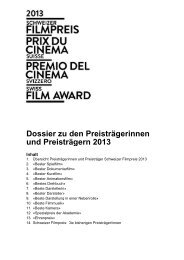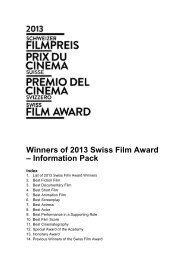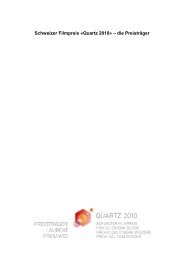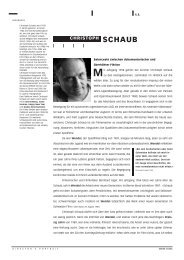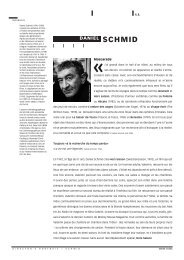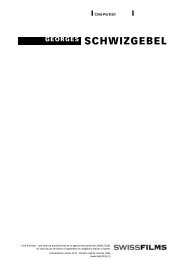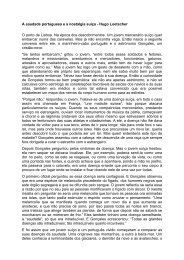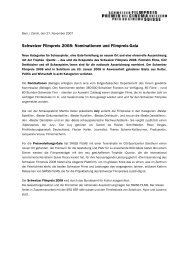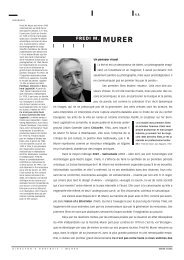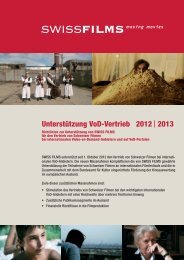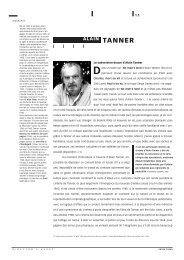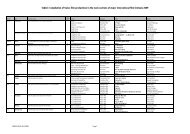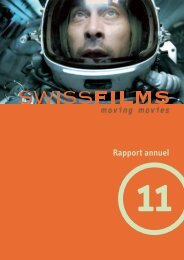Director's Portrait Fredi M. Murer - Swiss Films
Director's Portrait Fredi M. Murer - Swiss Films
Director's Portrait Fredi M. Murer - Swiss Films
You also want an ePaper? Increase the reach of your titles
YUMPU automatically turns print PDFs into web optimized ePapers that Google loves.
D I R E C T O R ’ S P O R T R A I T<br />
Seven questions to <strong>Fredi</strong> M. <strong>Murer</strong> by Irene Genhart<br />
1.4.<br />
INTERVIEW<br />
What does Switzerland mean to you? Switzerland is the country into which I was born – I had no<br />
say in the matter – and the country that, in terms of language, mentality and thinking, has shaped<br />
me to a degree I would never have thought possible. When I was asked, as a child, what I wanted to<br />
be when I grew up, apparently I always said: a foreigner. As a teenager, I refused to say “I’m <strong>Swiss</strong>”<br />
and would declare defiantly: “I am a person.” As an adult, I then realized, to my horror, that I had<br />
become <strong>Swiss</strong> first and a human being second. Despite this, I never stopped fighting against that<br />
overt “<strong>Swiss</strong>ness”, which in itself is a very <strong>Swiss</strong> attribute, or at least typical of my generation of<br />
’68. To me, Switzerland is, to quote the playwright Dürrenmatt, the “most open of prisons”, a place<br />
that, in my insatiable wanderlust, I have kept on leaving – I’ve visited almost every continent – only<br />
to return placated and with a greater sense of affection: I have shot every single one of my films in<br />
Switzerland.<br />
What do the children we encounter in your films, from MARCEL to FULL MOON, represent?<br />
If only I knew that myself. The main character in my new film is a twelve-year-old boy, too… Clearly,<br />
children make good “projection characters”. I certainly don’t see them as angels or saints: they<br />
make love to their sisters, do away with their parents or disappear without a trace… to my mind,<br />
children are the most credible representatives of intellectual honesty. The absoluteness and radic-<br />
alism of their thinking is still undiminished, perhaps because they don’t distinguish between reality<br />
and make-believe. I still believe that we reach our intellectual peak at the age of around twelve,<br />
and then, as we pass through school and the authorities get hold of us, we begin the process of<br />
conforming to social norms, sliding inexorably into safe normality.<br />
My childhood, which I spent in a large family in Nidwalden and Uri, provides me with an<br />
inexhaustible source of archetypal images and recollected feelings, which to this day are the life-<br />
blood of my artistic work: the “raw material” of all my films is provided by this early phase of my<br />
life. By choosing film as my medium, I have managed to smuggle a wonderful “sandpit” into my<br />
adulthood: on the screen, I can make my characters do and say things that I never would have got<br />
away with as a child.<br />
What do the three phrases: Artist – Art – Creativity/Artificiality mean to you? As a young<br />
boy, I was a talented gymnast, so I also felt like an artist. The way I saw it, there was an element of<br />
art involved in contorting your limbs into unnatural positions. But I was equally drawn to the show<br />
aspect. When I was older, I learned poems and Nietzsche texts by heart, and recited them at oppor-<br />
tune moments for dramatic effect. So, I felt like an artist at a very early age and thought that school<br />
SWISS FILMS



